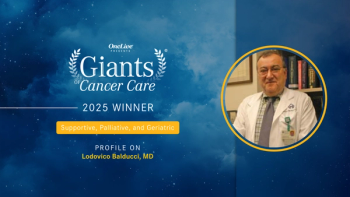
Clinical Trials of Post-Progression Therapy for mRCC
Transcript:Robert A. Figlin, MD: Toni, let’s dive into the data a little bit. We have 3 randomized trials. We have nivolumab’s randomized trial, which is a pivotal phase III trial. We have cabozantinib, where you were the principal investigator and it was a pivotal trial obtaining its approval. And then we have a randomized phase II trial with lenvatinib/everolimus. It also obtained its approval in the second-line setting. Summarize the data as you filter it through your process, and then how you use that data or how you would help practicing physicians to use that data to make decisions. What are the pros and cons of each of those data sets that help them make decisions about an individual patient?
Toni K. Choueiri, MD: Absolutely. Let me go through the data first by the FDA approval date. So, we start with the CheckMate-025. It’s a phase III trial of nivolumab versus everolimus in patients previously treated with up to 2 lines of a VEGF TKI. This trial showed that the primary endpoint was overall survival and was met, showing a clinically relevant and statistically significant overall survival from nivolumab compared to everolimus. Progression-free survival was not statistically significant—again, throwing this endpoint that we were used to in the era of VEGF therapy—and that may not be the right endpoint with single-agent PD-1 inhibitor. The response rates were also higher. Interestingly enough, the drug was well-tolerated and there’s a separate publication in Lancet Oncology by Dr. Sella showing clearly that the drug has a better quality of life than everolimus overall through the patient treatment.
The second that got approval, several months later, is cabozantinib, based on the METEOR clinical trial which had no limit on prior line of therapy as long as you had 1 VEGF TKI. It compared, again, everolimus versus cabozantinib. The primary endpoint was progression-free survival, and also that was met. It was 7.4 months versus less than 4 months with everolimus. And, if you look at the population of patients that we see in clinic, the ones that have sunitinib first-line and then go to second-line, the progression-free survival in the subgroup for cabozantinib was a bit over 9 months, 9.1 months. And the response rates were higher, and, actually, in an updated analysis, the trifecta was achieved. Cabozantinib achieved an overall survival benefit, first TKI, compared to everolimus.
The side effects were quite similar to what were used with VEGF tyrosine kinase inhibitor. The third drug that got approved is lenvatinib in combination with everolimus. Initially, this was quite a surprise for us. We’re oncologists, and drug A, class A work, class B work, we have to combine them. So, there has been significant work from the industry, and from the Cooperative Group, trying to combine an mTOR with a VEGF inhibitor. For sunitinib and bevacizumab with temsirolimus, or with everolimus, either didn’t proceed to the next level because they showed toxicity but didn’t show added efficacy. But I think here, the phase I of lenvatinib/everolimus was very carefully dosed, and lenvatinib does provide, in addition to the VEGF receptor, FGFR inhibition. If this is also a mechanism of VEGF resistance, that remains to be seen.
But in this randomized phase II study, a smaller study, the combination was superior to everolimus for progression-free survival, response rate, and overall survival, and led to the drug approval. All these studies were against everolimus, never compared head-to-head, and my guess is they will never be compared head-to-head. Why? Because these drugs, in a large part, are moving to the frontline setting, whether as single-agent or as combination, which makes it very hard to choose when a patient progresses on a first-line VEGF tyrosine kinase inhibitor.
There is a randomized phase II trial now, that was recently published, that compared sunitinib versus cabozantinib. It’s not approved for the first-line treatment, but this smaller study, a 157-patient Alliance-led cooperative study, showed cabozantinib to be superior to sunitinib. But this was specifically in a population that had intermediate- and poor-risk where we think, in addition to the VEGF blockade, inhibiting MET, AXL, and other mechanism of resistance to VEGF inhibitor may provide a benefit. So, the study has been read for the progression-free survival and for the response rate, and there is more follow-up going to happen to look at survival in general and to look at center review.
Robert A. Figlin, MD: For your patients, just to put you on the line—and I’ll do this for all of us—absence of clinical trial availability, do you have a preferred sequence of how you approach the majority of patients?
Toni K. Choueiri, MD: Yes. So in the absence of clinical trial and absence of comorbidities, which is very important—people that just had a heart attack, significant side effects from a VEGF TKI, still have their proteinuria, etc, or let’s say no autoimmune disease—I think patients that are progressing somewhat fast, especially with visceral metastases, I have done cabozantinib. And the reason for that is the small, very low rate, 12%, of PD as best response from cabozantinib, and the significant amount of tumor shrinkage that this drug does have in the second-line setting. To me, I do not want to lose the battle. I want something to hold the patient quickly and effectively. Certainly, for patients that can come to clinic and that struggled on a TKI, there is no immediate urgency to treat. Like what David said, I have a lot of patients that really don’t want to come every 2 weeks to the Longwood area and also don’t want to go locally. I find that sometimes it’s hard to justify every 2 weeks with them. So, they would like to communicate by email, through the nursing, but for an oral therapy like they were used to. Otherwise, it would be nivolumab.
Transcript Edited for Clarity





































